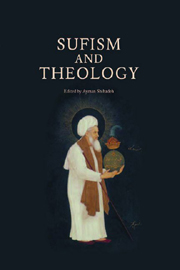Book contents
- Frontmatter
- Contents
- Contributors
- Acknowledgements
- Introduction
- Part I Mystical Theologies
- Part II Theological Approaches to Sufism
- 6 The Mystic and the Sceptic in Fakhr al-Dīn al-Rāzī
- 7 Ibn Taymiyya's Commentary on the Creed of al-Ḥallāj
- 8 Ibn Kemāl (d. 940/1534) on Ibn 'Arabī's Hagiology
- 9 Scriptural Sufism and Scriptural Anti-Sufism: Theology and Mysticism amongst the Shī'ī Akhbāriyya
- 10 Reconciling Sufism with Theology: Abū l-Wafā al-Taftāzānī and the Construct of ‘al-Taṣawwuf al-Islāmī’ in Modern Egypt
- Index
8 - Ibn Kemāl (d. 940/1534) on Ibn 'Arabī's Hagiology
from Part II - Theological Approaches to Sufism
Published online by Cambridge University Press: 12 September 2012
- Frontmatter
- Contents
- Contributors
- Acknowledgements
- Introduction
- Part I Mystical Theologies
- Part II Theological Approaches to Sufism
- 6 The Mystic and the Sceptic in Fakhr al-Dīn al-Rāzī
- 7 Ibn Taymiyya's Commentary on the Creed of al-Ḥallāj
- 8 Ibn Kemāl (d. 940/1534) on Ibn 'Arabī's Hagiology
- 9 Scriptural Sufism and Scriptural Anti-Sufism: Theology and Mysticism amongst the Shī'ī Akhbāriyya
- 10 Reconciling Sufism with Theology: Abū l-Wafā al-Taftāzānī and the Construct of ‘al-Taṣawwuf al-Islāmī’ in Modern Egypt
- Index
Summary
The rapid and extensive spread of Ibn 'Arabī's metaphysics gave new energy to a well-established set of latent tensions in Islamic intellectual life. While Sufism's validity as a generic category of inward disciplinary tools was hardly ever challenged, the formal articulation of claims to a direct and unitary mystical experience periodically raised difficulties for the 'ulamā'. Alexander Knysh has charted some of the arguments which arose in connection with Ibn 'Arabī's attempt to offer a comprehensive mystical theology rooted in his own inspirations (futūḥāt). However Knysh's survey, while invaluable, is focused largely on the debate in the Arabic-speaking world, and our knowledge of analogous arguments elsewhere, particularly in India and the Turkic lands, remains extremely uneven. The present essay will seek to examine the reception of Ibn ‘Arabī's hagiology by an emblematic Ottoman Shaykh al-Islām (şeyhūlislām), Ibn Kemāl (Ibn Kamāl), also known as Kemālpāşāzāde (d. 940/1534), regarded by admirers as the ‘Avicenna of Anatolia’.
The new Ottoman state inherited a set of intellectual problems which had been current amongst the scholars of Seljuk Anatolia, and which were revitalised by scholarly refugees from the Timurid onslaught in Central Asia and Iran. The Ottoman debates were carried out by a strong Māturīdī and Ḥanafī class of scholars ('ilmiyye) which determined the curricula and the parameters of discussion in the Ottoman medreses, and which helped shape the ruling establishment's understanding of itself as the custodian of a polity which should make conspicuous claims to Islamic legitimacy and leadership.
- Type
- Chapter
- Information
- Sufism and Theology , pp. 137 - 157Publisher: Edinburgh University PressPrint publication year: 2007



